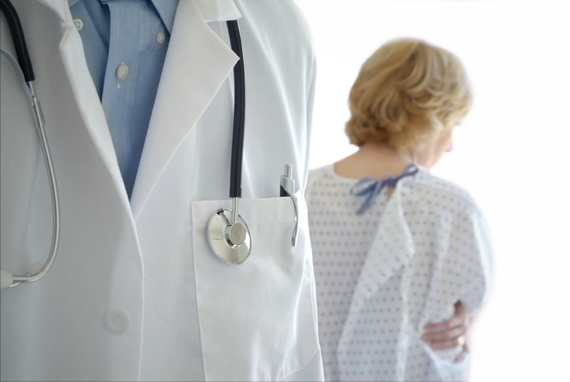A while ago, I wrote about "The Secret Lives of Doctors." The post must have struck a nerve because it went viral, maybe because it helped patients to realize that doctors are human.
We doctors can't really know how human we are until we become a patient.
That happened to me recently. And it wasn't pretty.
I truly understood what patients are really thinking. In that moment, all my "doctor-ness" flew out the window.
In the end, I think the experience will make me a better doctor. But, right now, allow me to apologize to my patients. I had no idea. None. But now I know: being a patient is tough.
Being a patient is tough because we are at the mercy of everyone else. We have to wait on the phone for an appointment. (Doctors have to wait while the receptionist finds a time for an appointment that won't require us to cancel our patients' surgeries.) We have to wait while the staff triple checks that we have acceptable insurance. And of course, we have to wait to be seen. For days. Maybe weeks. Maybe more.
Being a patient is tough because we're scared. We know just enough to be afraid. And then we Google what we think is the rest of the story, which scares us even more. (Free doctorly advice: Don't Google your symptoms.)
Being a patient is tough because it's hard.
It's hard to wait in a big waiting room with a slew of strangers, to sit next to someone who is just as scared as we are. It's hard to not be able to eat or drink anything for eight hours before a test. It's hard to have to wait until after an hour-long exam and tests before we can have labs drawn and then we can finally eat something.
It's hard because everyone who works in the office complex or hospital knows where they're going but we have no idea. We wander down the wrong hallway aimlessly and no one says, "Can I help you?" They just assume we know where we're going because they do.
When we see a doctor, after an hour-long wait (in case you're wondering: No, I don't get in to see a doctor any more quickly than you do -- my being a doctor doesn't matter nor should it), we can see how tired they are but we still want help with our problems. And both doctor and patient can end up frustrated for the lack of answers. (Some diagnoses take more time than others.)
We don't want to be wimps, but we feel our eyes fill with tears when our doctors tell us they're not sure. They need to order more tests. We look away so the doctors won't see our tears.
I now appreciate that patients try to protect the doctors just like we protect you.
When we have the scheduled tests, they are often worse than we anticipated. They can be stressful, noisy, painful, nausea-inducing, and just plain horrific and no amount of kindness from the technician can make them better.
We push through, counting backward from 100 by threes, hoping that we will either make it through the tests or pass out trying. We wonder if the tests are worse than the problems.
We go through the maze, trying to be kind to everyone. We notice things others might not see: that the nurse is worried because it is after 5 p.m. and her child will still be waiting by the school bus stop; that the appointment secretary squeezed us in for follow-up visits when no available times existed; that the doctors have to sit down for a bit because they're sometimes on their feet for 10 hours a day.
My recent experience taught me that doctor and patient are two sides of the same coin - and it's a toss up, literally, which side we are on. Every day.
It all called to mind Dr. Albert Schweitzer's words: "It's supposed to be a professional secret, but I'll tell you anyway. We doctors do nothing. We only help and encourage the doctor within."
